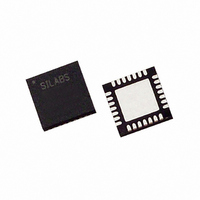C8051F311-GMR Silicon Laboratories Inc, C8051F311-GMR Datasheet - Page 129

C8051F311-GMR
Manufacturer Part Number
C8051F311-GMR
Description
IC 8051 MCU 16K FLASH 28MLP
Manufacturer
Silicon Laboratories Inc
Series
C8051F31xr
Specifications of C8051F311-GMR
Core Processor
8051
Core Size
8-Bit
Speed
25MHz
Connectivity
SMBus (2-Wire/I²C), SPI, UART/USART
Peripherals
POR, PWM, Temp Sensor, WDT
Number Of I /o
25
Program Memory Size
16KB (16K x 8)
Program Memory Type
FLASH
Ram Size
1.25K x 8
Voltage - Supply (vcc/vdd)
2.7 V ~ 3.6 V
Data Converters
A/D 17x10b
Oscillator Type
Internal
Operating Temperature
-40°C ~ 85°C
Package / Case
28-VQFN Exposed Pad, 28-HVQFN, 28-SQFN, 28-DHVQFN
Package
24QFN EP
Device Core
8051
Family Name
C8051F31x
Maximum Speed
25 MHz
Operating Supply Voltage
3.3 V
Data Bus Width
8 Bit
Number Of Programmable I/os
25
Interface Type
I2C/SMBus/SPI/UART
On-chip Adc
17-chx10-bit
Number Of Timers
4
For Use With
336-1446 - ADAPTER PROGRAM TOOLSTICK F311336-1253 - DEV KIT FOR C8051F310/F311
Lead Free Status / RoHS Status
Lead free / RoHS Compliant
Eeprom Size
-
Available stocks
Company
Part Number
Manufacturer
Quantity
Price
Part Number:
C8051F311-GMR
Manufacturer:
SILICON LABS/èٹ¯ç§‘
Quantity:
20 000
13. Port Input/Output
Digital and analog resources are available through 29 I/O pins (C8051F310/2/4), or 25 I/O pins
(C8051F311/3/5), or 21 I/O pins (C8051F316/7). Port pins are organized as three byte-wide Ports and one
5-bit-wide (C8051F310/2/4) or 1-bit-wide (C8051F311/3/5) Port. In the C8051F316/7, the port pins are
organized as one byte-wide Port, two 6-bit-wide Ports and one 1-bit-wide Port. Each of the Port pins can
be defined as general-purpose I/O (GPIO) or analog input; Port pins P0.0-P2.3 can be assigned to one of
the internal digital resources as shown in Figure 13.3. The designer has complete control over which func-
tions are assigned, limited only by the number of physical I/O pins. This resource assignment flexibility is
achieved through the use of a Priority Crossbar Decoder. The state of a Port I/O pin can always be read in
the corresponding Port latch, regardless of the Crossbar settings.
The Crossbar assigns the selected internal digital resources to the I/O pins based on the Priority Decoder
(Figure 13.3 and Figure 13.4). The registers XBR0 and XBR1, defined in SFR Definition 13.1 and SFR
Definition 13.2, are used to select internal digital functions.
All Port I/Os are 5 V tolerant (refer to Figure 13.2 for the Port cell circuit). The Port I/O cells are configured
as either push-pull or open-drain in the Port Output Mode registers (PnMDOUT, where n = 0,1,2,3). Com-
plete Electrical Specifications for Port I/O are given in Table 13.1 on page 143.
Highest
Priority
Lowest
Priority
Figure 13.1. Port I/O Functional Block Diagram
SYSCLK
Outputs
Outputs
SMBus
UART
T0, T1
P0
P1
P2
P3
CP0
CP1
PCA
SPI
(P0.0-P0.7)
(P1.0-P1.7)
(P2.0-P2.3)
(P2.4-P2.7)
(P3.0-P3.4)
2
4
2
2
2
6
2
8
8
4
4
5
Rev. 1.7
PnSKIP Registers
XBR0, XBR1,
Crossbar
Decoder
Priority
Digital
C8051F310/1/2/3/4/5/6/7
4
4
8
8
PnMDIN Registers
8
5
Notes:
1. P3.1-P3.4 only available on the
C8051F310/2/4
2. P1.6,P1.7,P2.6,P2.7 only available
on the C8051F310/1/2/3/4/5
PnMDOUT,
Cells
Cells
Cells
Cells
I/O
I/O
I/O
I/O
P0
P1
P2
P3
P0.0
P0.7
P1.0
P1.7
P2.0
P2.7
P3.0
P3.4
129











